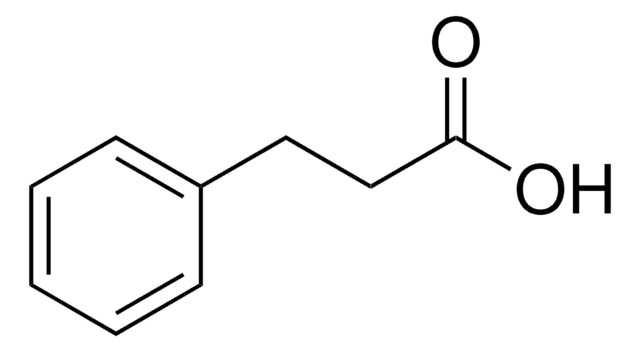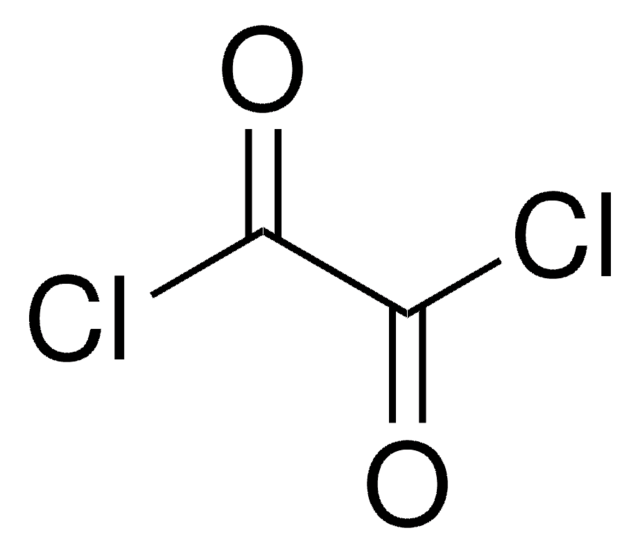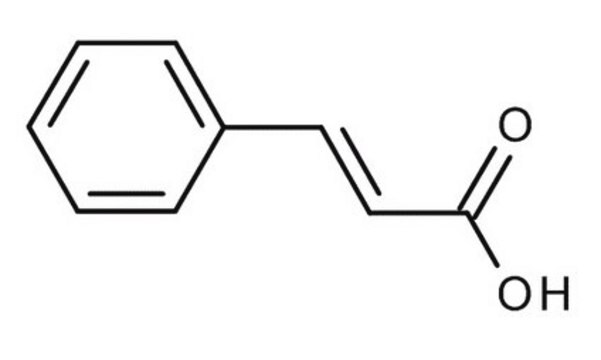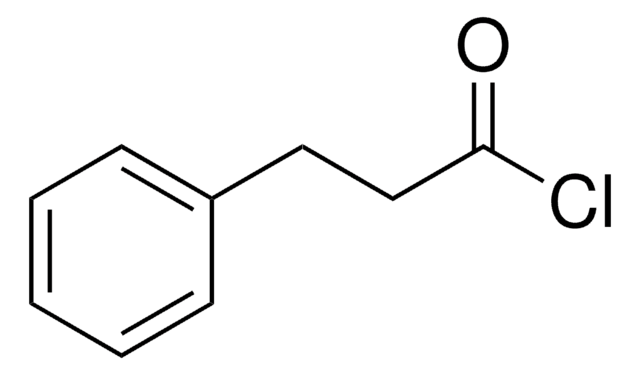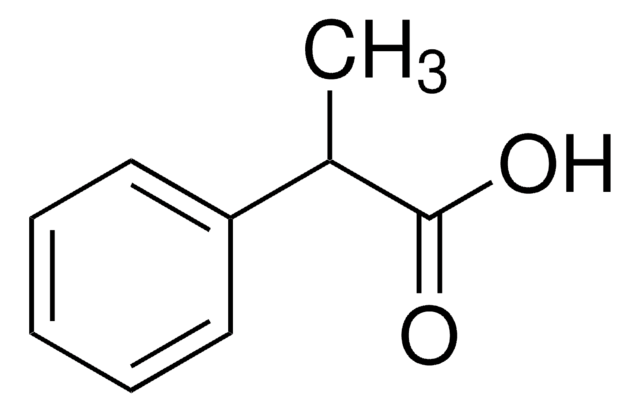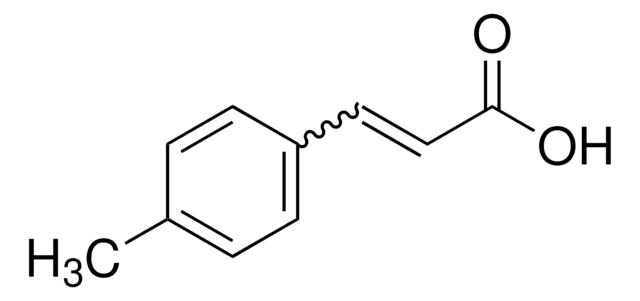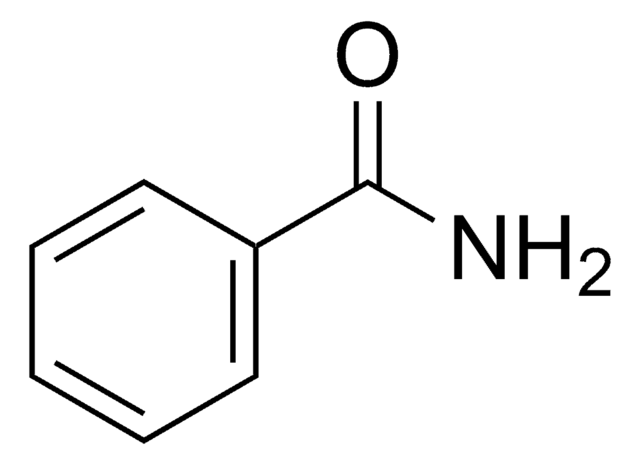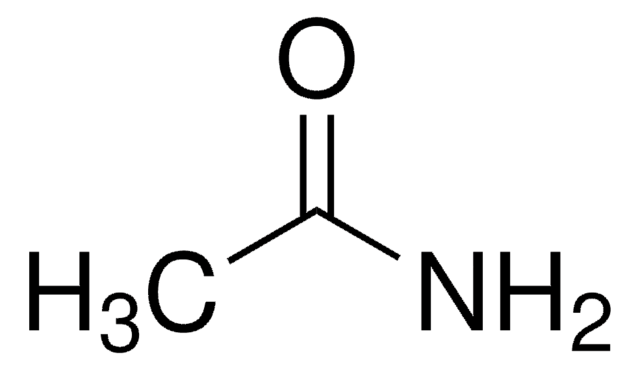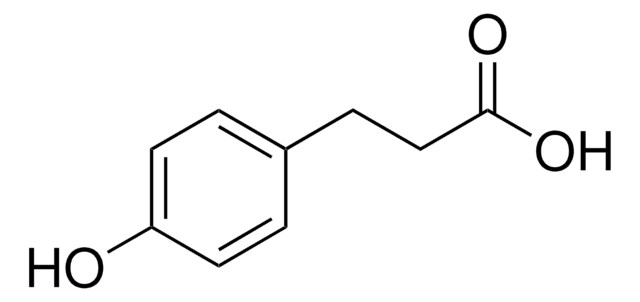135232
Hydrocinnamic acid
99%
Synonym(s):
3-Phenylpropionic acid, Benzylacetic acid
Sign Into View Organizational & Contract Pricing
All Photos(3)
About This Item
Linear Formula:
C6H5CH2CH2COOH
CAS Number:
Molecular Weight:
150.17
Beilstein:
907515
EC Number:
MDL number:
UNSPSC Code:
12352100
PubChem Substance ID:
NACRES:
NA.22
Recommended Products
Quality Level
Assay
99%
form
solid
bp
280 °C (lit.)
mp
45-48 °C (lit.)
solubility
ethanol: soluble 50 mg/mL, clear, colorless to faintly yellow
density
1.071 g/mL at 25 °C (lit.)
functional group
carboxylic acid
phenyl
SMILES string
OC(=O)CCc1ccccc1
InChI
1S/C9H10O2/c10-9(11)7-6-8-4-2-1-3-5-8/h1-5H,6-7H2,(H,10,11)
InChI key
XMIIGOLPHOKFCH-UHFFFAOYSA-N
Looking for similar products? Visit Product Comparison Guide
General description
Hydrocinnamic acid forms complexes with uranium(VI) and has been investigated in aqueous solution by attenuated total reflection fourier transform infrared spectroscopy. Hydrocinnamic acids are the major rhizospheric compounds with known growth regulatory activity.
Application
Hydrocinnamic acid was used in the synthesis of three medium-chain acyl-Coenzyme A′s i.e. 3-phenylpropionyl-CoA from mixed anhydrides of fatty acids.
Storage Class Code
11 - Combustible Solids
WGK
WGK 1
Flash Point(F)
235.4 °F - closed cup
Flash Point(C)
113 °C - closed cup
Personal Protective Equipment
dust mask type N95 (US), Eyeshields, Gloves
Choose from one of the most recent versions:
Already Own This Product?
Find documentation for the products that you have recently purchased in the Document Library.
Customers Also Viewed
Hany F Sobhi et al.
Analytical biochemistry, 401(1), 114-124 (2010-02-27)
The measurement of acyl-CoA dehydrogenase activities is an essential part of the investigation of patients with suspected defects in fatty acid oxidation. Multiple methods are available for the synthesis of the substrates used for measuring acyl-CoA dehydrogenase activities; however, the
C S Tang et al.
Plant physiology, 69(1), 155-160 (1982-01-01)
Collection of allelopathic chemicals from the undisturbed plant root system is difficult because of their low concentrations and the high level of contaminants in growth media such as soil. A new approach for the continuous trapping of quantities of extracellular
Daibin Kuang et al.
Small (Weinheim an der Bergstrasse, Germany), 3(12), 2094-2102 (2007-11-22)
Efficient and stable mesoscopic dye-sensitized solar cells (DSCs) introducing a low-viscosity binary ionic liquid (1-propyl-3-methyl-imidazolium iodide (PMII) and 1-ethyl-3-methyl-imidazolium tetracyanoborate (EMIB(CN)(4))) electrolyte in combination with a new high-molar-extinction-coefficient ruthenium complex, Ru(2,2'-bipyridine-4,4'-dicarboxylic acid)(4,4'-bis(2-(4-tert-butyloxy -phenyl)ethenyl) -2,2'-bipyridine) (NCS)(2), are demonstrated. The dependence of
Astrid Barkleit et al.
Applied spectroscopy, 62(7), 798-802 (2008-10-22)
Uranyl complexes with phenylalanine and the analogous ligand phenylpropionate were investigated in aqueous solution by attenuated total reflection (ATR) Fourier transform infrared (FT-IR) spectroscopy. The assignment of the observed bands to vibrational modes was accomplished using spectra of the pure
Marion Sander et al.
Planta, 233(6), 1157-1171 (2011-02-15)
cDNAs and genes encoding a hydroxycinnamoyl-CoA:hydroxyphenyllactate hydroxycinnamoyltransferase (CbRAS; rosmarinic acid synthase) and a hydroxycinnamoyl-CoA:shikimate hydroxycinnamoyltransferase (CbHST) were isolated from Coleus blumei Benth. (syn. Solenostemon scutellarioides (L.) Codd; Lamiaceae). The proteins were expressed in E. coli and the substrate specificity of
Our team of scientists has experience in all areas of research including Life Science, Material Science, Chemical Synthesis, Chromatography, Analytical and many others.
Contact Technical Service
